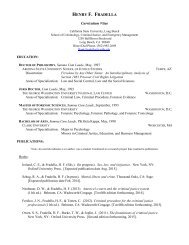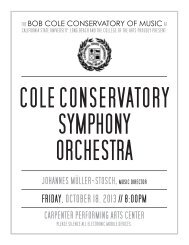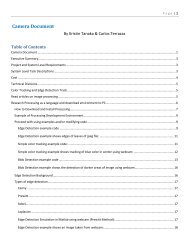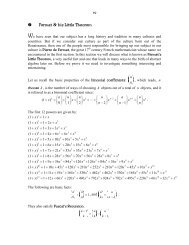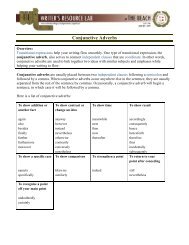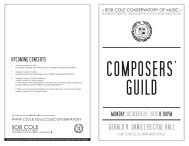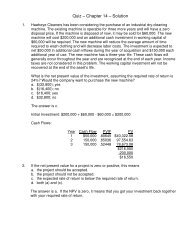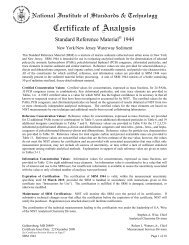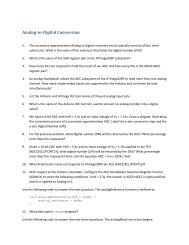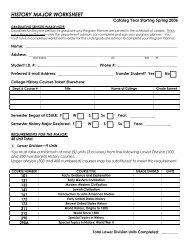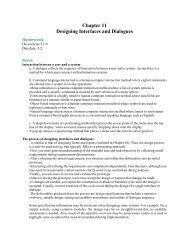Untitled - California State University, Long Beach
Untitled - California State University, Long Beach
Untitled - California State University, Long Beach
Create successful ePaper yourself
Turn your PDF publications into a flip-book with our unique Google optimized e-Paper software.
geaf me treasure ond symbel, sibbe gemunde;<br />
næs ic him to life laðra owihte,<br />
beorn in burgum þonne his bearna hwylc,<br />
Herebeald ond Hæðcyn oððe Hygelac min. (2428-2434)<br />
[I was seven winters old when my lord of treasures / friend and<br />
lord of the people, took me from my father / King Hrethel kept<br />
and held me. / Gave me treasure and feast, kinship remembered.<br />
/ I was not to him in life hostile aught, / a man in the residence,<br />
than of whichever of his sons / Herebeald and Hæðcyn or my<br />
(lord) Hygelac.]<br />
Beowulf equivocates his own upbringing as equal to that of his uncles,<br />
indicating that Beowulf was being groomed by Hreðel to assume the<br />
throne potentially, a possibility that certainly becomes more real after the<br />
death of Hreðel’s son Herebeald. Jamison discusses the close relationship<br />
of matrilineal kinship that can easily be applied to Beowulf and what we<br />
do know of his mother: “the union might be more tightly sealed if the<br />
bride’s son were sent back to her own people to be raised by maternal<br />
uncles and to live among maternal cousins” (14). The fact that Beowulf<br />
rejects the throne he was clearly being groomed for by Hreðel and served<br />
for under Hygelac shows that Beowulf has little regard for the wellbeing<br />
of the bloodline to which both he and his mother belong. Given<br />
that Beowulf was raised by Hreðel, the lack of discussion regarding her<br />
whereabouts is even more alarming.<br />
The uncertainty regarding Beowulf’s mother takes an even more<br />
bizarre turn when Hroþgar gives a speech about Beowulf’s heroism<br />
following Grendel’s mother’s defeat. Where one might expect Hroþgar to<br />
praise Beowulf’s father Ecgþeow for raising a brave warrior who excels at<br />
battle, Hroþgar instead turns his praise to Beowulf’s mother:<br />
Hwæt, þæt secgan mæg<br />
efne swa hwylc mægþa<br />
68 | Sevi<br />
swan ðone magan cende<br />
æfter gumcynnum, gyf heo gyt lyfat,<br />
þæt hyre ealdmetod este wære<br />
bearngebyrdo. (942b-946a)<br />
[What that may say / even so whichever of women / thus bore<br />
this man, / among humankind, if she yet lives, / that the gold of<br />
old was gracious to her / of child-bearing.]<br />
Praising Beowulf’s mother for her excellence in child-bearing appears<br />
to go against the conventions that we might expect for a warrior being<br />
praised after battle. Hroþgar, here, contributes Beowulf’s success to the<br />
good fortune of his mother, rather than his father Ecgþeow, to whom<br />
Beowulf is linked, by name, seventeen times in the text. 4 When Beowulf<br />
is fighting Grendel, however, he is consistently referred to, by the<br />
schop, as “mæg Higelaces” or “kin of Hygelac” (see lines 737 or 758<br />
for examples) thus affirming his association with his mother’s kin in<br />
one of his most important victories. Given the fact that Beowulf was<br />
raised by his mother’s family, perhaps Hroþgar is giving a nod to that<br />
particular relationship—this becomes more likely when considering<br />
Hroþgar’s own history with Ecgþeow—Hroþgar explains how he paid<br />
the were-gild for a murder Beowulf’s father committed in lines 457-472,<br />
concluding “he me aþas swor” [“he to me swore oaths”] (472)—which<br />
cements Beowulf’s debt to Hroþgar and reminds Beowulf of his kinship<br />
ties to his mother’s line. Given the seeming importance of the speech,<br />
though, it is odd that Beowulf’s mother is not given a name (people are<br />
given a name for much less reason in the narrative) and, moreover, it<br />
is unclear whether she is still alive or dead. That this information is all<br />
unknown, and especially unknown by Hroþgar who clearly has history<br />
with Beowulf’s kin, is disquieting and shows Beowulf’s blatant disregard<br />
to his mother’s kin who raised him and groomed him for kingship from<br />
a young age. Beowulf then continually rejects his mother, and, when he<br />
Sevi | 69



